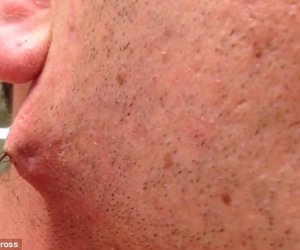Dentist removing 15 MAGGOTS from inside little girl's gum

A dentist investigating a schoolgirl with swollen gums was horrified to discover more than a dozen maggots living inside her mouth.
Ana Cardoso, 10, had been taken to the clinic in Brazil after complaining of a tingling sensation in her gums and things 'moving around'.
Her stunned mother Adriana, 35, said: 'She had been saying for a few days that she felt something moving around in her mouth and at first I thought she was joking.
'I couldn't see anything and she didn't seem to be in pain.
But then it started getting worse and no matter how much we brushed her teeth she said she still felt something.
'I know my daughter and she is not one to make up stories or lie, so eventually I took her to see a dentist.'
There, Ana, from the Brazilian capital, Brasilia, was diagnosed with a rare form of oral myiasis.
This is a fly lava maggot infection that grows in humans and animals.
'I couldn't believe it when they said she had a disease and then started pulling the maggots out,' said Ms Cardoso.
'I thought I was going to be sick.'
A spokesman for the dental surgery said: 'There were 15 maggots in her mouth so we videoed the removal for our records as it is a rare occurrence.
'We also wanted to show the girl's family what had happened and warn others.'
The video shows Ana's reaction as a surgeon in white gloves takes out one maggot at a time with a pair of tweezers.
Ms Cardoso said: 'She was actually very calm throughout the whole process but I suspect that was more out of helplessness.
'I mean, what else could she do?'
Myiasis comes from the Latin word 'myia' meaning fly and 'iasis' means disease.
The flies' larvae can feed on the host's living or dead tissue, liquid body substance, or ingested food.
When the tissues in the oral cavity are invaded by parasites, this is known as oral myiasis.
Those at risk of the rare condition include those from poorer social backgrounds and people who have suffered wounds or other injury to the face.
It is also more common in regions with a warmer climate.
Infestations of the nose and ears are dangerous because of the possibility of penetration into the brain, the fatality rate is 8 per cent in such cases.
(dailymail.co.uk)
ANN.Az
Similar news
Similar news




































 Photo
Photo 



 Video
Video 
